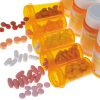- Empty cart.
- Continue Shopping
Understanding Drug Interactions: What to Avoid

In today’s world, medications play a vital role in maintaining and improving our health. However, it’s important to recognize that not all drugs play well together. Understanding drug interactions is crucial to ensuring the effectiveness and safety of your medications. Some interactions can reduce a drug’s effectiveness, while others can lead to harmful side effects.
Section 1: Types of Drug Interactions
Pharmacokinetic Interactions
Pharmacokinetic interactions involve changes in the way a drug is absorbed, distributed, metabolized, or excreted in the body. These interactions can result in altered drug concentrations in the bloodstream, affecting the drug’s effectiveness and safety. Common factors that contribute to pharmacokinetic interactions include liver enzymes, which are responsible for drug metabolism, and drug transport proteins that affect drug distribution.
Pharmacodynamic Interactions
Pharmacodynamic interactions occur when two or more drugs with similar or opposing effects are taken together. This can lead to enhanced or reduced therapeutic effects, as well as an increased risk of side effects. For example, combining two drugs that lower blood pressure may lead to excessively low blood pressure, causing dizziness or fainting.
Drug-Food Interactions
Certain foods and beverages can interact with medications, affecting their absorption and effectiveness. For instance, grapefruit juice is known to inhibit enzymes responsible for drug metabolism, potentially leading to increased drug concentrations in the bloodstream. It’s essential to be aware of specific dietary restrictions when taking certain medications.
Section 2: Medications to Avoid Mixing
Grapefruit and Medications
As mentioned earlier, grapefruit juice can interact with various medications, including those for high blood pressure, cholesterol control, and immunosuppression. The compounds in grapefruit juice can inhibit the activity of the enzyme CYP3A4, responsible for metabolizing many drugs. This interaction can lead to higher drug concentrations in the body, increasing the risk of side effects.
Alcohol and Medications
Combining alcohol with certain medications can be dangerous. Alcohol can enhance the sedative effects of medications like pain relievers, sleeping pills, and antihistamines, increasing the risk of drowsiness, impaired coordination, and accidents. It can also interfere with the metabolism of drugs, potentially leading to elevated drug levels in the bloodstream.
Over-the-Counter (OTC) Medications and Prescriptions
While OTC medications are readily available and seem harmless, they can interact with prescription drugs. For example, non-prescription pain relievers like ibuprofen or aspirin can increase the risk of bleeding when taken with blood-thinning medications like warfarin. Always inform your healthcare provider about any OTC drugs, supplements, or herbal remedies you are taking.
Section 3: Communicating with Healthcare Professionals
The Importance of Disclosure
Open and honest communication with your healthcare provider is crucial to avoid drug interactions. Make sure to provide a comprehensive list of all medications you are taking, including prescription drugs, OTC medications, supplements, and herbal remedies. Your healthcare provider needs this information to make informed decisions about your treatment plan.
Asking Questions
Don’t hesitate to ask questions about potential drug interactions when starting a new medication. Inquire about possible side effects, food or beverage restrictions, and whether the medication may interact with your existing drugs. If you have concerns about a prescribed medication, discuss alternative options with your healthcare provider.
Regular Medication Reviews
Medication reviews should be a routine part of your healthcare. Periodically review your medication list with your healthcare provider to ensure it remains appropriate for your current health status. As your health changes, your medication needs may change as well, and adjustments may be necessary to prevent interactions.
In conclusion, understanding drug interactions and knowing what to avoid is essential for maintaining your health and ensuring the effectiveness of your medications. The types of interactions, medications to avoid mixing, and effective communication with healthcare professionals are all critical components of this understanding. By being proactive, staying informed, and actively engaging with your healthcare team, you can minimize the risks associated with drug interactions and make more informed decisions about your health. Remember, your safety and well-being are the top priorities in managing your medications.








